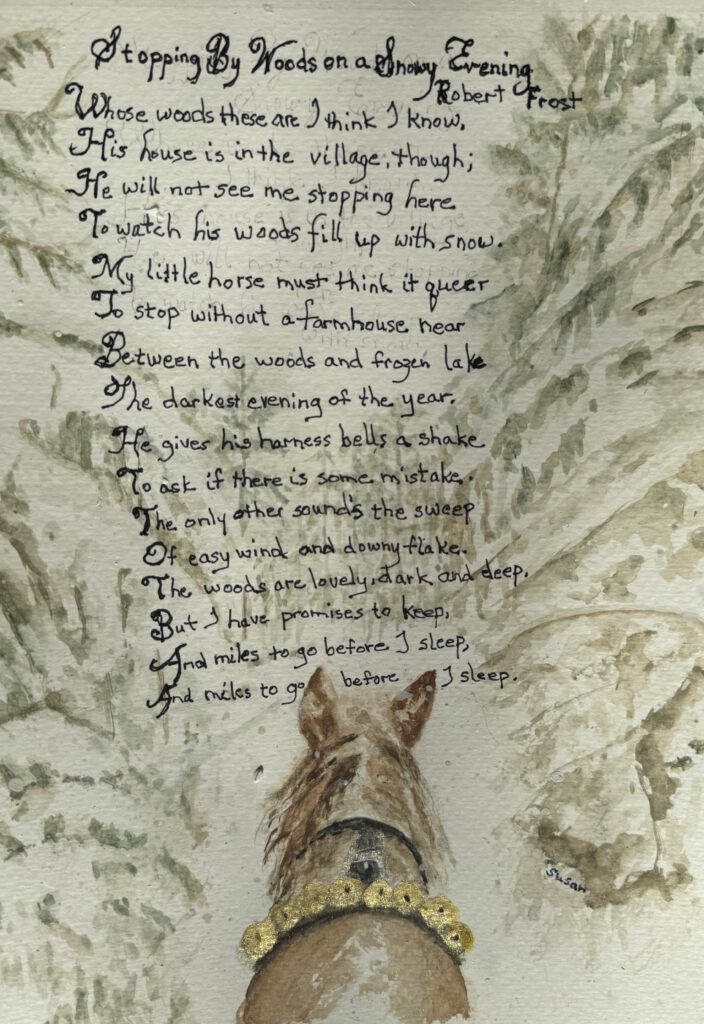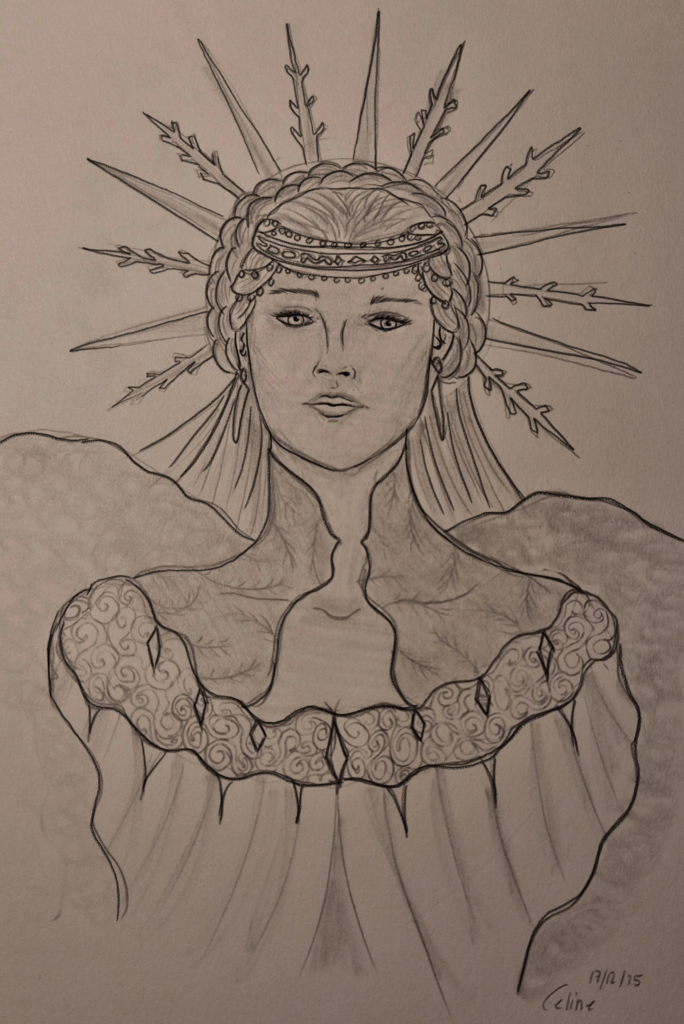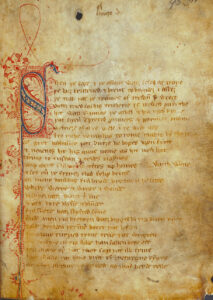“London Snow“
by Robert Bridges
Read by Patricia Klaß Advent Calendar day one

When men were all asleep the snow came flying,
In large white flakes falling on the city brown,
Stealthily and perpetually settling and loosely lying,
Hushing the latest traffic of the drowsy town;
Deadening, muffling, stifling its murmurs failing;
Lazily and incessantly floating down and down:
Silently sifting and veiling road, roof and railing;
Hiding difference, making unevenness even,
Into angles and crevices softly drifting and sailing.
All night it fell, and when full inches seven
It lay in the depth of its uncompacted lightness,
The clouds blew off from a high and frosty heaven;
And all woke earlier for the unaccustomed brightness
Of the winter dawning, the strange unheavenly glare:
The eye marvelled—marvelled at the dazzling whiteness;
The ear hearkened to the stillness of the solemn air;
No sound of wheel rumbling nor of foot falling,
And the busy morning cries came thin and spare.
Then boys I heard, as they went to school, calling,
They gathered up the crystal manna to freeze
Their tongues with tasting, their hands with snowballing;
Or rioted in a drift, plunging up to the knees;
Or peering up from under the white-mossed wonder,
‘O look at the trees!’ they cried, ‘O look at the trees!’
With lessened load a few carts creak and blunder,
Following along the white deserted way,
A country company long dispersed asunder:
When now already the sun, in pale display
Standing by Paul’s high dome, spread forth below
His sparkling beams, and awoke the stir of the day.
For now doors open, and war is waged with the snow;
And trains of sombre men, past tale of number,
Tread long brown paths, as toward their toil they go:
But even for them awhile no cares encumber
Their minds diverted; the daily word is unspoken,
The daily thoughts of labour and sorrow slumber
At the sight of the beauty that greets them, for the charm they have broken.
“…wonders and meruayles of a swerde that was taken out of a stone by the sayd Arthur” from Le Morte Darthur (1485)
by Sir Thomas Malory
Read by Laurie Atkinson adventcal_02

The text below is from Sir Thomas Malory, Le Morte Darthur (Wesminster: William Caxton, 1485), sigs a3v-a4v; a lightly modernised version can be read in Sir Thomas Malory, Le Morte Darthur, ed. Helen Cooper (Oxford: Oxford University Press, 1998), pp. 8-11, available online at https://archive.org/details/lemortedarthurwi0000malo_q2n3/page/8/mode/2up.
Thenne stood the reame in grete ieopardy long whyle / for euery lord that was myghty of men maade hym stronge / and many wende to haue ben kyng / Thenne Merlyn wente to the archebisshop of Caunterbury / and counceilled hym for to sende for alle the lordes of the reame / and alle the gentilmen of armes that they shold to london come by Cristmas vpon payne of cursynge / And for this cause that Ieshu that was borne on that nyghte that he wold of his grete mercy shewe some myracle / as he was come to be kynge of mankynde for to shewe somme myracle who shold be rightwys kynge of this reame / So the Archebisshop by the aduys of Merlyn send for alle the lordes and gentilmen of armes that they shold come by crystmasse euen vnto london / And many of hem made hem clene of her lyf that her prayer myghte be the more acceptable vnto god / Soo in the grettest chirch of london whether it were Powlis or not the Frensshe booke maketh no mencyon / alle the estates were longe or day in the chirche for to praye / And whan matyns and the first masse was done / there was sene in the chircheyard ayenst the hyhe aulter a grete stone four square lyke vnto a marbel stone / And in myddes therof was lyke an Anuylde of stele a foot on hyghe / and theryn stack a fayre swerd naked by the poynt / and letters / there were wryten in gold aboute the swerd that saiden thus / who so pulleth oute this swerd of this stone and anuyld / is rightwys kynge borne of all Enlond / Thenne the peple merueilled and told it to the Archebisshop I commande said tharchebisshop that ye kepe yow within your chirche / and pray vnto god still that no man touche the suerd tyll the hyhe masse be all done / So whan all masses were done all the lordes wente to beholde the stone and the swerd / And whan they sawe the scripture / som assayed suche as wold haue ben kyng / But none myght stere the swerd nor meue hit He is not here said the Archebisshop that shall encheue the swerd but doubte not god will make hym knowen / But this is my counceill said the archebisshop / that we lete puruey x knyʒtes men of good fame / and they to kepe this swerd / so it was ordeydeyned / and thenne ther was made a crye / that euery man shold assay that wold for to wynne the swerd / And vpon newe yeersday the barons lete maake a Iustes and a tournement / that alle knyʒtes shat wold Iuste or tourneye / there myʒt playe / and all this was ordeyned for to kepe the lordes to gyders and the comyns / for the Archebisshop trusted / that god wold make hym knowe that shold wynne the swerd / So vpon newe yeresday whan the seruyce was done / the barons rode vnto the feld / some to Iuste / and som to torney / and so it happed that syre Ector that had grete lyuelode aboute london rode vnto the Iustes / and with hym rode syr kaynus his sone and yong Arthur that was hys nourisshed broder / and syr kay was made knyʒt at al halowmas afore So as they rode to the Iustes ward / sir kay had lost his suerd for he had lefte it at his faders lodgyng / and so he prayd yong Arthur for to ryde for his swerd / I wyll wel said Arthur / and rode fast after that swerd / and whan he cam home / the lady and al were out to see the Ioustyng / thenne was Arthur wroth and saide to hym self / I will ryde to the chircheyard / and take the swerd with me that stycketh in the stone / for my broder sir kay shal not be without a swerd this day / so whan he cam to the chircheyard sir Arthur aliʒt and tayed his hors to the style / and so he wente to the tent / and found no knyʒtes there / for they were atte Iustyng and so he handled the swerd by the handels / and liʒtly and fiersly pulled it out of the stone / and took his hors and rode his way vntyll he came to his broder sir kay / and delyuerd hym the swerd / and as sone as sir kay saw the swerd he wist wel it was the swerd of the stone / and so he rode to his fader syr Ector / and said / sire / loo here is the swerd of the stone / wherfor I must be kyng of thys land / when syre Ector beheld the swerd / he retorned ageyne and cam to the chirche / and there they aliʒte al thre / and wente in to the chirche / And anon he made sir kay to swere vpon a book / how he came to that swerd / Syr said sir kay by my broder Arthur for he brought it to me / how gate ye this swerd said sir Ector to Arthur / sir I will telle you when I cam home for my broders swerd / I fond no body at home to delyuer me his swerd And so I thought my broder syr kay shold not be swerdles and so I cam hyder egerly and pulled it out of the stone withoute ony payn / found ye ony knyʒtes about this swerd seid sir ector Nay said Arthur / Now said sir Ector to Arthur I vnderstande ye must be kynge of this land / wherfore I / sayd Arthur and for what cause / Sire saide Ector / for god wille haue hit soo for ther shold neuer man haue drawen oute this swerde / but he that shal be rightwys kyng of this land / Now lete me see whether ye can putte the swerd ther as it was / and pulle hit oute ageyne / that is no maystry said Arthur / and soo he put it in the stone / therwith alle Sir Ector assayed to pulle oute the swerd and faylled
Capitulum sextum
Now assay said Syre Ector vnto Syre kay / And anon he pulled at the swerd with alle his myghte / but it wold not be / Now shal ye assay said Syre Ector to Arthur I wyll wel said Arthur and pulled it out easily / And ther with alle Syre Ector knelyd doune to the erthe and Syre Kay / Allas said Arthur myne own dere fader and broder why knole ye to me / Nay nay my lord Arthur / it is not so I was neuer your fader nor of your blood / but I wote wel ye are of an hyher blood than I wende ye were / And thenne Syre Ector told hym all how he was bitaken hym for to nourisshe hym And by whoos commandement / and by Merlyns delyueraunce ¶ Thenne Arthur made grete doole whan he vnderstood that Syre Ector was not his fader / Sir said Ector vnto Arthur woll ye be my good and gracious lord when ye are kyng / els were I to blame said arthur for ye are the man in the world that I am most be holdyng to / and my good lady and moder your wyf that as wel as her owne hath fostred me and kepte / And yf euer hit be goddes will that I be kynge as ye say / ye shall desyre of me what I may doo / and I shalle not faille yow / god forbede I shold faille yow / Sir said Sire Ector / I will aske no more of yow / but that ye wille make my sone your foster broder Syre Kay Seuceall of alle your landes / That shalle be done said Arthur / and more by the feith of my body that neuer man shalle haue that office but he whyle he and I lyue / There with all they wente vnto the Archebisshop / and told hym how the swerd was encheued / and by whome / and on twelfth day alle the barons cam thyder / and to assay to take the swerd who that wold assay / But there afore hem alle ther myghte none take it out but Arthur
“To a Wreath of Snow”
by Emily Brontë
Read by Eva Marik
adventcal_03

O transient voyager of heaven!
O silent sign of winter skies!
What adverse wind thy sail has driven
To dungeons where a prisoner lies?
Methinks the hands that shut the sun
So sternly from this morning′s brow
Might still their rebel task have done
And checked a thing so frail as thou.
They would have done it had they known
The talisman that dwelt in thee,
For all the suns that ever shone
Have never been so kind to me!
For many a week, and many a day
My heart was weighed with sinking gloom
When morning rose in mourning grey
And faintly lit my prison room
But angel like, when I awoke,
Thy silvery form, so soft and fair
Shining through darkness, sweetly spoke
Of cloudy skies and mountains bare;
The dearest to a mountaineer
Who, all life long has loved the snow
That crowned his native summits drear,
Better, than greenest plains below.
And voiceless, soulless, messenger
Thy presence waked a thrilling tone
That comforts me while thou art here
And will sustain when thou art gone
“Winter: My Secret“
by Christina Rossetti
Read by Luisa Stihl
adventcal_04

I tell my secret? No indeed, not I:
Perhaps some day, who knows?
But not to-day; it froze, and blows and snows,
And you’re too curious: fie!
You want to hear it? well:
Only, my secret’s mine, and I won’t tell.
Or, after all, perhaps there’s none:
Suppose there is no secret after all,
But only just my fun.
To-day’s a nipping day, a biting day;
In which one wants a shawl,
A veil, a cloak, and other wraps:
I cannot ope to everyone who taps,
And let the draughts come whistling thro’ my hall;
Come bounding and surrounding me,
Come buffeting, astounding me,
Nipping and clipping through my wraps and all.
I wear my mask for warmth: who ever shows
His nose to Russian snows
To be pecked at by every wind that blows?
You would not peck? I thank you for good will,
Believe, but leave the truth untested still.
Spring’s an expansive time: yet I don’t trust
March with its peck of dust,
Nor April with its rainbow-crowned brief showers,
Nor even May, whose flowers
One frost may wither thro’ the sunless hours.
Perhaps some languid summer day,
When drowsy birds sing less and less,
And golden fruit is ripening to excess,
If there’s not too much sun nor too much cloud,
And the warm wind is neither still nor loud,
Perhaps my secret I may say,
Or you may guess.
“Ring Out, Wild Bells“, from In Memoriam A.H.H.
by Alfred, Lord Tennyson
Read by Andrew Edmonds
adventcal_05
 Ring out, wild bells, to the wild sky,
Ring out, wild bells, to the wild sky,
The flying cloud, the frosty light:
The year is dying in the night;
Ring out, wild bells, and let him die.
Ring out the old, ring in the new,
Ring, happy bells, across the snow:
The year is going, let him go;
Ring out the false, ring in the true.
Ring out the grief that saps the mind
For those that here we see no more;
Ring out the feud of rich and poor,
Ring in redress to all mankind.
Ring out a slowly dying cause,
And ancient forms of party strife;
Ring in the nobler modes of life,
With sweeter manners, purer laws.
Ring out the want, the care, the sin,
The faithless coldness of the times;
Ring out, ring out my mournful rhymes
But ring the fuller minstrel in.
Ring out false pride in place and blood,
The civic slander and the spite;
Ring in the love of truth and right,
Ring in the common love of good.
Ring out old shapes of foul disease;
Ring out the narrowing lust of gold;
Ring out the thousand wars of old,
Ring in the thousand years of peace.
Ring in the valiant man and free,
The larger heart, the kindlier hand;
Ring out the darkness of the land,
Ring in the Christ that is to be.
“Annunciation” and “Nativity”
by John Donne
Read by Alexander Edmonds
adventcal_06

Annunciation
Salvation to all that will is nigh;
That All, which always is all everywhere,
Which cannot sin, and yet all sins must bear,
Which cannot die, yet cannot choose but die,
Lo, faithful virgin, yields Himself to lie
In prison, in thy womb; and though He there
Can take no sin, nor thou give, yet He will wear,
Taken from thence, flesh, which death\’s force may try.
Ere by the spheres time was created, thou
Wast in His mind, who is thy Son and Brother;
Whom thou conceivst, conceived; yea thou art now
Thy Maker\’s maker, and thy Father\’s mother;
Thou hast light in dark, and shutst in little room,
Immensity cloistered in thy dear womb.
Nativity
Immensity cloistered in thy dear womb,
Now leaves His well-belov\’d imprisonment,
There He hath made Himself to His intent
Weak enough, now into the world to come;
But O, for thee, for Him, hath the inn no room?
Yet lay Him in this stall, and from the Orient,
Stars and wise men will travel to prevent
The effect of Herod\’s jealous general doom.
Seest thou, my soul, with thy faith\’s eyes, how He
Which fills all place, yet none holds Him, doth lie?
Was not His pity towards thee wondrous high,
That would have need to be pitied by thee?
Kiss Him, and with Him into Egypt go,
With His kind mother, who partakes thy woe.
“Frost at Midnight“
by Samuel Taylor Coleridge
Read by Mehmet Özdemir
adventcal_07
The Frost performs its secret ministry,
Unhelped by any wind. The owlet’s cry
Came loud—and hark, again! loud as before.
The inmates of my cottage, all at rest,
Have left me to that solitude, which suits
Abstruser musings: save that at my side
My cradled infant slumbers peacefully.
’Tis calm indeed! so calm, that it disturbs
And vexes meditation with its strange
And extreme silentness. Sea, hill, and wood,
This populous village! Sea, and hill, and wood,
With all the numberless goings-on of life,
Inaudible as dreams! the thin blue flame
Lies on my low-burnt fire, and quivers not;
Only that film, which fluttered on the grate,
Still flutters there, the sole unquiet thing.
Methinks, its motion in this hush of nature
Gives it dim sympathies with me who live,
Making it a companionable form,
Whose puny flaps and freaks the idling Spirit
By its own moods interprets, every where
Echo or mirror seeking of itself,
And makes a toy of Thought.
But O! how oft,
How oft, at school, with most believing mind,
Presageful, have I gazed upon the bars,
To watch that fluttering stranger ! and as oft
With unclosed lids, already had I dreamt
Of my sweet birth-place, and the old church-tower,
Whose bells, the poor man’s only music, rang
From morn to evening, all the hot Fair-day,
So sweetly, that they stirred and haunted me
With a wild pleasure, falling on mine ear
Most like articulate sounds of things to come!
So gazed I, till the soothing things, I dreamt,
Lulled me to sleep, and sleep prolonged my dreams!
And so I brooded all the following morn,
Awed by the stern preceptor’s face, mine eye
Fixed with mock study on my swimming book:
Save if the door half opened, and I snatched
A hasty glance, and still my heart leaped up,
For still I hoped to see the stranger’s face,
Townsman, or aunt, or sister more beloved,
My play-mate when we both were clothed alike!
Dear Babe, that sleepest cradled by my side,
Whose gentle breathings, heard in this deep calm,
Fill up the intersperséd vacancies
And momentary pauses of the thought!
My babe so beautiful! it thrills my heart
With tender gladness, thus to look at thee,
And think that thou shalt learn far other lore,
And in far other scenes! For I was reared
In the great city, pent ’mid cloisters dim,
And saw nought lovely but the sky and stars.
But thou, my babe! shalt wander like a breeze
By lakes and sandy shores, beneath the crags
Of ancient mountain, and beneath the clouds,
Which image in their bulk both lakes and shores
And mountain crags: so shalt thou see and hear
The lovely shapes and sounds intelligible
Of that eternal language, which thy God
Utters, who from eternity doth teach
Himself in all, and all things in himself.
Great universal Teacher! he shall mould
Thy spirit, and by giving make it ask.
Therefore all seasons shall be sweet to thee,
Whether the summer clothe the general earth
With greenness, or the redbreast sit and sing
Betwixt the tufts of snow on the bare branch
Of mossy apple-tree, while the nigh thatch
Smokes in the sun-thaw; whether the eave-drops fall
Heard only in the trances of the blast,
Or if the secret ministry of frost
Shall hang them up in silent icicles,
Quietly shining to the quiet Moon.
From Hamlet, 1.1.
by William Shakespeare
Read by ‘Dumbshow’ (aka. Jonathan Sharp, Robert McColl, and Hanno Dorneich)
adventcal_08

As found on: https://shakespeare.mit.edu/hamlet/hamlet.1.1.html
HORATIO
That can I;
At least, the whisper goes so. Our last king,
Whose image even but now appear’d to us,
Was, as you know, by Fortinbras of Norway,
Thereto prick’d on by a most emulate pride,
Dared to the combat; in which our valiant Hamlet–
For so this side of our known world esteem’d him–
Did slay this Fortinbras; who by a seal’d compact,
Well ratified by law and heraldry,
Did forfeit, with his life, all those his lands
Which he stood seized of, to the conqueror:
Against the which, a moiety competent
Was gaged by our king; which had return’d
To the inheritance of Fortinbras,
Had he been vanquisher; as, by the same covenant,
And carriage of the article design’d,
His fell to Hamlet. Now, sir, young Fortinbras,
Of unimproved mettle hot and full,
Hath in the skirts of Norway here and there
Shark’d up a list of lawless resolutes,
For food and diet, to some enterprise
That hath a stomach in’t; which is no other–
As it doth well appear unto our state–
But to recover of us, by strong hand
And terms compulsatory, those foresaid lands
So by his father lost: and this, I take it,
Is the main motive of our preparations,
The source of this our watch and the chief head
Of this post-haste and romage in the land.
BERNARDO
I think it be no other but e’en so:
Well may it sort that this portentous figure
Comes armed through our watch; so like the king
That was and is the question of these wars.
HORATIO
A mote it is to trouble the mind’s eye.
In the most high and palmy state of Rome,
A little ere the mightiest Julius fell,
The graves stood tenantless and the sheeted dead
Did squeak and gibber in the Roman streets:
As stars with trains of fire and dews of blood,
Disasters in the sun; and the moist star
Upon whose influence Neptune’s empire stands
Was sick almost to doomsday with eclipse:
And even the like precurse of fierce events,
As harbingers preceding still the fates
And prologue to the omen coming on,
Have heaven and earth together demonstrated
Unto our climatures and countrymen.–
But soft, behold! lo, where it comes again!
Re-enter Ghost
I’ll cross it, though it blast me. Stay, illusion!
If thou hast any sound, or use of voice,
Speak to me:
If there be any good thing to be done,
That may to thee do ease and grace to me,
Speak to me:
Cock crows
If thou art privy to thy country’s fate,
Which, happily, foreknowing may avoid, O, speak!
Or if thou hast uphoarded in thy life
Extorted treasure in the womb of earth,
For which, they say, you spirits oft walk in death,
Speak of it: stay, and speak! Stop it, Marcellus.
MARCELLUS
Shall I strike at it with my partisan?
HORATIO
Do, if it will not stand.
BERNARDO
’Tis here!
HORATIO
’Tis here!
MARCELLUS
’Tis gone!
Exit Ghost
We do it wrong, being so majestical,
To offer it the show of violence;
For it is, as the air, invulnerable,
And our vain blows malicious mockery.
BERNARDO
It was about to speak, when the cock crew.
HORATIO
And then it started like a guilty thing
Upon a fearful summons. I have heard,
The cock, that is the trumpet to the morn,
Doth with his lofty and shrill-sounding throat
Awake the god of day; and, at his warning,
Whether in sea or fire, in earth or air,
The extravagant and erring spirit hies
To his confine: and of the truth herein
This present object made probation.
MARCELLUS
It faded on the crowing of the cock.
Some say that ever ’gainst that season comes
Wherein our Saviour’s birth is celebrated,
The bird of dawning singeth all night long:
And then, they say, no spirit dares stir abroad;
The nights are wholesome; then no planets strike,
No fairy takes, nor witch hath power to charm,
So hallow’d and so gracious is the time.
HORATIO
So have I heard and do in part believe it.
But, look, the morn, in russet mantle clad,
Walks o’er the dew of yon high eastward hill:
Break we our watch up; and by my advice,
Let us impart what we have seen to-night
Unto young Hamlet; for, upon my life,
This spirit, dumb to us, will speak to him.
Do you consent we shall acquaint him with it,
As needful in our loves, fitting our duty?
MARCELLUS
Let’s do’t, I pray; and I this morning know
Where we shall find him most conveniently.
Exeunt
“The Gift“
by William Carlos Williams
Read by Patricia Klaß
adventcal_09

As the wise men of old brought gifts
guided by a star
to the humble birthplace
of the god of love,
the devils
as an old print shows
retreated in confusion.
What could a baby know
of gold ornaments
or frankincense and myrrh,
of priestly robes
and devout genuflections?
But the imagination
knows all stories
before they are told
and knows the truth of this one
past all defection
The rich gifts
so unsuitable for a child
though devoutly proffered,
stood for all that love can bring.
The men were old
how could they know
of a mother’s needs
or a child’s
appetite?
But as they kneeled
the child was fed.
They saw it
and
gave praise!
A miracle
had taken place,
hard gold to love,
a mother’s milk!
before
their wondering eyes.
The ass brayed
the cattle lowed.
It was their nature.
All men by their nature give praise.
It is all
they can do.
The very devils
by their flight give praise.
What is death,
beside this?
Nothing. The wise men
came with gifts
and bowed down
to worship
this perfection.
“The House of Christmas”
by G. K. Chesterton
Read by Amanda Vernon
adventcal_10

There fared a mother driven forth
Out of an inn to roam;
In the place where she was homeless
All men are at home.
The crazy stable close at hand,
With shaking timber and shifting sand,
Grew a stronger thing to abide and stand
Than the square stones of Rome.
For men are homesick in their homes,
And strangers under the sun,
And they lay on their heads in a foreign land
Whenever the day is done.
Here we have battle and blazing eyes,
And chance and honour and high surprise,
But our homes are under miraculous skies
Where the yule tale was begun.
A Child in a foul stable,
Where the beasts feed and foam;
Only where He was homeless
Are you and I at home;
We have hands that fashion and heads that know,
But our hearts we lost – how long ago!
In a place no chart nor ship can show
Under the sky’s dome.
This world is wild as an old wives’ tale,
And strange the plain things are,
The earth is enough and the air is enough
For our wonder and our war;
But our rest is as far as the fire-drake swings
And our peace is put in impossible things
Where clashed and thundered unthinkable wings
Round an incredible star.
To an open house in the evening
Home shall men come,
To an older place than Eden
And a taller town than Rome.
To the end of the way of the wandering star,
To the things that cannot be and that are,
To the place where God was homeless
And all men are at home.
From “A Christmas Tree”
by Charles Dickens
Read by Nikki Berger
adventcal_11

As found at https://short-stories.co/@charlesdickens/a-christmas-tree-qpkv58eqvr91
There is probably a smell of roasted chestnuts and other good comfortable things all the time, for we are telling Winter Stories– Ghost Stories, or more shame for us–round the Christmas fire; and we have never stirred, except to draw a little nearer to it. But, no matter for that. We came to the house, and it is an old house, full of great chimneys where wood is burnt on ancient dogs upon the hearth, and grim portraits (some of them with grim legends, too) lower distrustfully from the oaken panels of the walls. We are a middle-aged nobleman, and we make a generous supper with our host and hostess and their guests–it being Christmas-time, and the old house full of company–and then we go to bed. Our room is a very old room. It is hung with tapestry. We don’t like the portrait of a cavalier in green, over the fireplace. There are great black beams in the ceiling, and there is a great black bedstead, supported at the foot by two great black figures, who seem to have come off a couple of tombs in the old baronial church in the park, for our particular accommodation. But, we are not a superstitious nobleman, and we don’t mind. Well! we dismiss our servant, lock the door, and sit before the fire in our dressing-gown, musing about a great many things. At length we go to bed. Well! we can’t sleep. We toss and tumble, and can’t sleep. The embers on the hearth burn fitfully and make the room look ghostly. We can’t help peeping out over the counterpane, at the two black figures and the cavalier–that wicked- looking cavalier–in green. In the flickering light they seem to advance and retire: which, though we are not by any means a superstitious nobleman, is not agreeable. Well! we get nervous– more and more nervous. We say \”This is very foolish, but we can’t stand this; we’ll pretend to be ill, and knock up somebody.\” Well! we are just going to do it, when the locked door opens, and there comes in a young woman, deadly pale, and with long fair hair, who glides to the fire, and sits down in the chair we have left there, wringing her hands. Then, we notice that her clothes are wet. Our tongue cleaves to the roof of our mouth, and we can’t speak; but, we observe her accurately. Her clothes are wet; her long hair is dabbled with moist mud; she is dressed in the fashion of two hundred years ago; and she has at her girdle a bunch of rusty keys. Well! there she sits, and we can’t even faint, we are in such a state about it. Presently she gets up, and tries all the locks in the room with the rusty keys, which won’t fit one of them; then, she fixes her eyes on the portrait of the cavalier in green, and says, in a low, terrible voice, \”The stags know it!\” After that, she wrings her hands again, passes the bedside, and goes out at the door. We hurry on our dressing-gown, seize our pistols (we always travel with pistols), and are following, when we find the door locked. We turn the key, look out into the dark gallery; no one there. We wander away, and try to find our servant. Can’t be done. We pace the gallery till daybreak; then return to our deserted room, fall asleep, and are awakened by our servant (nothing ever haunts him) and the shining sun. Well! we make a wretched breakfast, and all the company say we look queer. After breakfast, we go over the house with our host, and then we take him to the portrait of the cavalier in green, and then it all comes out. He was false to a young housekeeper once attached to that family, and famous for her beauty, who drowned herself in a pond, and whose body was discovered, after a long time, because the stags refused to drink of the water. Since which, it has been whispered that she traverses the house at midnight (but goes especially to that room where the cavalier in green was wont to sleep), trying the old locks with the rusty keys. Well! we tell our host of what we have seen, and a shade comes over his features, and he begs it may be hushed up; and so it is. But, it’s all true; and we said so, before we died (we are dead now) to many responsible people.
“Christmas aboard the Endurance” from South: The Endurance Expedition
by Sir Ernest Shackleton
Read by Jonathan Sharp
adventcal_12

As found at https://www.gutenberg.org/files/5199/5199-h/5199-h.htm
Heavy floes held up the ship from midnight till 6 a.m. on December 25, Christmas Day. Then they opened a little and we made progress till 11.30 a.m., when the leads closed again. We had encountered good leads and workable ice during the early part of the night, and the noon observation showed that our run for the twenty-four hours was the best since we entered the pack a fortnight earlier. We had made 71 miles S. 4° W. The ice held us up till the evening, and then we were able to follow some leads for a couple of hours before the tightly packed floes and the increasing wind compelled a stop. The celebration of Christmas was not forgotten. Grog was served at midnight to all on deck. There was grog again at breakfast, for the benefit of those who had been in their bunks at midnight. Lees had decorated the wardroom with flags and had a little Christmas present for each of us. Some of us had presents from home to open. Later there was a really splendid dinner, consisting of turtle soup, whitebait, jugged hare, Christmas pudding, mince-pies, dates, figs and crystallized fruits, with rum and stout as drinks. In the evening everybody joined in a “sing-song.” Hussey had made a one-stringed violin, on which, in the words of Worsley, he “discoursed quite painlessly.” The wind was increasing to a moderate south-easterly gale and no advance could be made, so we were able to settle down to the enjoyments of the evening.
Excerpt from Sir Gawain and the Green Knight
translated by J.R.R. Tolkien
Read by Hanno Dorneich
adventcal_13
Part I
1. When the siege and the assault had ceased at Troy,
and the fortress fell in flame to firebrands and ashes,
the traitor who the contrivance of treason there fashioned
was tried for his treachery, the most true upon earth –
it was Æneas the noble and his renowned kindred
who then laid under them lands, and lords became
of well-nigh all the wealth in the Western Isles.
When royal Romulus to Rome his road had taken,
in great pomp and pride. He peopled it first,
and named it with his own name that yet now it bears;
Tirius went to Tuscany and towns founded,
Langaberde in Lombardy uplifted halls,
and far over the French flood Felix Brutus
on many a broad bank and brae Britain established
full fair
where strange things, strife and sadness,
at whiles in the land did fare,
and each other grief and gladness
oft fast have followed there.
2. And when fair Britain was founded by this famous lord,
bold men were bred there who in battle rejoiced,
and many a time that betide they troubles aroused.
In this domain more marvels have by men been seen
than in any other that I know of since that olden time;
but of all that here abode in Britain as kings
ever was Arthur most honored, as I have heard men tell.
Wherefore a marvel among men I mean to recall,
a sight strange to see some men have held it,
one of the wildest adventures of the wonders of Arthur.
If you will listen to this lay but a little while now,
I will tell it at once as in town I have heard
it told,
as it is fixed and fettered
in story brave and bold,
thus linked and truly lettered,
as was loved in this land of old.
3. This king lay at Camelot at Christmas-tide
with many a lovely lord, lieges most noble,
indeed of the Table Round all those tried brethren,
amid merriment unmatched and mirth without care.
There tourneyed many a time the trusty knights,
and jousted full joyously these gentle lords;
then to the court they came at carols to play.
5. But Arthur would not eat until all were served;
his youth made him so merry with the moods of a boy,
he liked lighthearted life, so loved he the less
either long to be lying or long to be seated:
so worked on him his young blood and wayward brain.
And another rule moreover was his reason besides
that in pride he had appointed: it pleased him not to eat
upon festival so fair, ere he first were apprised
of some strange story or stirring adventure,
or some moving marvel that he might believe in
of noble men, knighthood, or new adventures;
or a challenger should come a champion seeking
to join with him in jousting, in jeopardy to set
his life against life, each allowing the other
the favor of fortune, were she fairer to him.
This was the king’s custom, wherever his court was holden,
at each famous feast among his fair company
in hall.
So his face doth proud appear,
and he stands up stout and tall,
all young in the New Year;
much mirth he makes with all.
6. Thus there stands up straight the stern king himself,
talking before the high table of trifles courtly.
There good Gawain was set at Guinevere’s side,
with Agravain a la Dure Main on the other side seated,
both their lord’s sister-sons, loyal-hearted knights.
Bishop Baldwin had the honor of the board’s service,
and Iwain Urien’s son ate beside him.
These dined on the dais and daintily fared,
and many a loyal lord below at the long tables.
Then forth came the first course with fanfare of trumpets,
on which many bright banners bravely were hanging;
noise of drums then anew and the noble pipes,
warbling wild and keen, wakened their music,
so that many hearts rose high hearing their playing.
Then forth was brought a feast, fare of the noblest,
multitude of fresh meats on so many dishes
that free places were few in front of the people
to set the silver things full of soups on cloth
so white.
Each lord of his liking there
without lack took with delight:
twelve plates to every pair,
good beer and wine all bright.
7. Now of their service I will say nothing more,
for you are all well aware that no want would there be.
Another noise that was new drew near on a sudden,
so that their lord might have leave at last to take food.
For hardly had the music but a moment ended,
and the first course in the court as was custom been served,
when there passed through the portals a perilous horseman,
the mightiest on middle-earth in measure of height,
from his gorge to his girdle so great and so square,
and his loins and his limbs so long and so huge,
that half a troll upon earth I trow that he was,
but the largest man alive at least I declare him;
and yet the seemliest for his size that could sit on a horse,
for though in back and in breast his body was grim,
both his paunch and his waist were properly slight,
and all his features followed his fashion so gay
in mode:
for at the hue men gaped aghast
in his face and form that showed;
as a fay-man fell he passed,
and green all over glowed.

“Stopping by Woods on a Snowy Evening”
by Robert Frost
Read by Fabienne Peterson
Painting by Susan Holliday
adventcal_14

Robert Frost (1874 – 1963)
Robert Frost, famous American poet, was born in California in 1874. He owned several large farms during his lifetime, where many of his poems are set.
Encouraged by the publication of his first poem at 19, Frost’s poems are famous for their unique conversational writing style, often reflecting Frost’s deep respect for nature. He once explained, “All my poems are love poems”.
Robert Frost was the only poet to have received four prestigious Pulitzer Prizes in his lifetime. He also was nominated several times for the Nobel Prize in Literature.
This is his work “Stopping by Woods on a Snowy Evening”
Whose woods these are I think I know.
His house is in the village though;
He will not see me stopping here
To watch his woods fill up with snow.
My little horse must think it queer
To stop without a farmhouse near
Between the woods and frozen lake
The darkest evening of the year.
He gives his harness bells a shake
To ask if there is some mistake.
The only other sound’s the sweep
Of easy wind and downy flake.
The woods are lovely, dark and deep,
But I have promises to keep,
And miles to go before I sleep,
And miles to go before I sleep.
“Mistletoe“
by Walter de La Mare
Read by Ann-Sophie Schmidt
adventcal_15

Sitting under the mistletoe
(Pale-green, fairy mistletoe),
One last candle burning low,
All the sleepy dancers gone,
Just one candle burning on,
Shadows lurking everywhere:
Some one came, and kissed me there.
Tired I was; my head would go
Nodding under the mistletoe
(Pale-green, fairy mistletoe),
No footsteps came, no voice, but only,
Just as I sat there, sleepy, lonely,
Stooped in the still and shadowy air
Lips unseen—and kissed me there.
“The Oxen“
by Thomas Hardy
Read by Avi Spencer-Blume
adventcal_16

Christmas Eve, and twelve of the clock.
“Now they are all on their knees,”
An elder said as we sat in a flock
By the embers in hearthside ease.
We pictured the meek mild creatures where
They dwelt in their strawy pen,
Nor did it occur to one of us there
To doubt they were kneeling then.
So fair a fancy few would weave
In these years! Yet, I feel,
If someone said on Christmas Eve,
“Come; see the oxen kneel,
“In the lonely barton by yonder coomb
Our childhood used to know,”
I should go with him in the gloom,
Hoping it might be so.
“Windigo“
by Louise Erdrich
Read by Cuan Olivier
adventcal_17

For Angela
The Windigo is a flesh-eating, wintry demon with a man buried deep inside of it. In some Chippewa stories, a young girl vanquishes this monster by forcing boiling lard down its throat, thereby releasing the human at the core of ice.
You knew I was coming for you, little one,
when the kettle jumped into the fire.
Towels flapped on the hooks,
and the dog crept off, groaning,
to the deepest part of the woods.
In the hackles of dry brush a thin laughter started up.
Mother scolded the food warm and smooth in the pot
and called you to eat.
But I spoke in the cold trees:
New one, I have come for you, child hide and lie still.
The sumac pushed sour red cones through the air.
Copper burned in the raw wood.
You saw me drag toward you.
Oh touch me, I murmured, and licked the soles of your feet.
You dug your hands into my pale, melting fur.
I stole you off, a huge thing in my bristling armor.
Steam rolled from my wintry arms, each leaf shivered
from the bushes we passed
until they stood, naked, spread like the cleaned spines of fish.
Then your warm hands hummed over and shoveled themselves full
of the ice and the snow. I would darken and spill
all night running, until at last morning broke the cold earth
and I carried you home,
a river shaking in the sun.
“Christmas Card from a Hooker in Minneapolis“
by Tom Waits
Read by Robert McColl
adventcal_18
[Verse 1]
Hey Charlie, I’m pregnant and living on 9th Street
Right above a dirty bookstore off Euclid Avenue
And I stopped takin’ dope, and I quit drinkin’ whiskey
And my old man plays the trombone and works out at the track
[Verse 2]
He says that he loves me even though it’s not his baby
He says that he’ll raise him up like he would his own son
And he gave me a ring that was worn by his mother
And he takes me out dancin’ every Saturday night
[Verse 3]
And hey Charlie, I think about you every time I pass a fillin’ station
On account of all the grease you used to wear in your hair
And I still have that record of Little Anthony and the Imperials
But someone stole my record player–now, how do you like that?
[Verse 4]
Hey Charlie, I almost went crazy after Mario got busted
I went back to Omaha to live with my folks
But everyone I used to know was either dead or in prison
So I came back to Minneapolis, this time I think I’m gonna stay

[Verse 5]
Hey Charlie, I think I’m happy for the first time since my accident
I wish I had all the money we used to spend on dope
I’d buy me a used car lot, and I wouldn’t sell any of ’em
I’d just drive a different car every day, dependin’ on how I feel
[Verse 6]
Hey Charlie, for chrissakes, if you want to know the truth of it
I don’t have a husband, he don’t play the trombone
I need to borrow money to pay this lawyer, and Charlie, hey
I’ll be eligible for parole come Valentine’s day
“For Another Birth“
by Louis Untermeyer
Read by Anneke Edmonds
adventcal_19

The miracle is now. The place is here.
No angel’s wings. No throne. No diadem.
Yet, in this hour locked and rocked with fear,
a birth may mark another Bethlehem.
No kings surround a cradle. Crowds roar by.
The shepherds have been missing since the war.
Yet darkness splinters a wintry sky
Unfolds and holds – again – a burning star.
This is a time for wonders. The world cries
For revelation, for another birth.
Dry sticks burst into blossom; dead bones rise;
And prophets whisper to a desperate earth.
Some child unborn may rescue us, for still
The wise men come with promise of release:
The myrrh of hope, the gold of men\’s good will,
The fresh and precious frankincense of peace.
Welcome all saints, all saviours of all time.
Welcome the thorns on every martyr’s brow.
Welcome the cross. Welcome the long, slow climb.
The place is here. The miracle is now.
From “The Snow Queen“
by Hans Christian Andersen
Read by Celine Beck
adventcal_20

As found on:
https://jazsakura-rose.medium.com/the-snow-queen-in-seven-stories-seventh-story-of-the-palace-of-the-snow-queen-and-what-cbce01276103
Little Kai was quite blue with cold,—indeed, almost black,—but he did not feel it; for the Snow Queen had kissed away the icy shiverings, and his heart was already a lump of ice. He dragged some sharp, flat pieces of ice to and fro and placed them together in all kinds of positions, as if he wished to make something out of them—just as we try to form various figures with little tablets of wood, which we call a \”Chinese puzzle.\” Kai’s figures were very artistic; it was the icy game of reason at which he played, and in his eyes the figures were very remarkable and of the highest importance; this opinion was owing to the splinter of glass still sticking in his eye. He composed many complete figures, forming different words, but there was one word he never could manage to form, although he wished it very much. It was the word \”Eternity.\”
The Snow Queen had said to him, \”When you can find out this, you shall be your own master, and I will give you the whole world and a new pair of skates.\” But he could not accomplish it.
\”Now I must hasten away to warmer countries,\” said the Snow Queen. \”I will go and look into the black craters of the tops of the burning mountains, Etna and Vesuvius, as they are called. I shall make them look white, which will be good for them and for the lemons and the grapes.\” And away flew the Snow Queen, leaving little Kai quite alone in the great hall which was so many miles in length. He sat and looked at his pieces of ice and was thinking so deeply and sat so still that any one might have supposed he was frozen.
Just at this moment it happened that little Gerda came through the great door of the castle. Cutting winds were raging around her, but she offered up a prayer, and the winds sank down as if they were going to sleep. On she went till she came to the large, empty hall and caught sight of Kai. She knew him directly; she flew to him and threw her arms around his neck and held him fast while she exclaimed, \”Kai, dear little Kai, I have found you at last!\”
But he sat quite still, stiff and cold.
Then little Gerda wept hot tears, which fell on his breast, and penetrated into his heart, and thawed the lump of ice, and washed away the little piece of glass which had stuck there. Then he looked at her, and she sang:
\”Roses bloom and fade away,
But we the Christ-child see alway.\”
Then Kai burst into tears. He wept so that the splinter of glass swam out of his eye. Then he recognized Gerda and said joyfully, \”Gerda, dear little Gerda, where have you been all this time, and where have I been?\” And he looked all around him and said, \”How cold it is, and how large and empty it all looks,\” and he clung to Gerda, and she laughed and wept for joy.
It was so pleasing to see them that even the pieces of ice danced, and when they were tired and went to lie down they formed themselves into the letters of the word which the Snow Queen had said he must find out before he could be his own master and have the whole world and a pair of new skates.
Gerda kissed his cheeks, and they became blooming; and she kissed his eyes till they shone like her own; she kissed his hands and feet, and he became quite healthy and cheerful. The Snow Queen might come home now when she pleased, for there stood his certainty of freedom, in the word she wanted, written in shining letters of ice.
Then they took each other by the hand, and went forth from the great palace of ice.
From “Bárðar saga Snæfellsáss” (in Old Norse)
Read by Rebecca Merkelbach
adventcal_21

The Old Norse text is from Bárðar saga Snæfellsáss (The Saga of Bárðr, Guardian-Spirit of Snæfell), chapter 18;
read from the edition in Íslenzk fornrit 13, ed. by Þórhallur Vilmundarson and Bjarni Vilhjálmsson (Reykjavík, 1991), pp. 160–62.
As found on Prof. Merkelbach’s Blog: https://everydaymonstrosity.wordpress.com/2025/12/09/excerpt-from-bardar-saga-snaefellsass-chapter-18/
Excerpt from Bárðar saga Snæfellsáss, chapter 18
Bárðar saga Snæfellsáss (The Saga of Bárðr, Guardian-Spirit of Snæfell) is an Icelandic saga from the 14th century. Its protagonists are all, uniquely, trolls! Gestr is Bárðr’s son and is visiting the Norwegian king Óláfr Tryggvason, who has just converted the country to Christianity. However, this does not stop the pagan paranormal from erupting into the court at Christmas – in a scene that some may find reminiscent of Sir Gawain and the Green Knight! It is, however, not unusual in the Sagas of Icelanders for revenants and other monsters to appear at Christmas. This is, after all, the darkest time of the year, particularly in Iceland…
“On Christmas Eve, the king sat on his throne with his entire entourage, each in their own place. The people were cheerful and in a good mood because the king was particularly happy. When the people had been drinking for a while, a man walked into the hall. He was big and evil looking, his skin was pale and his eyes unsteady, his beard black and his nose long. This man had a helmet on his head, he wore chain mail and was girded with a sword. He had a gold necklace around his neck and a thick gold ring on his arm. He walked quickly into the hall and to the king’s throne. He did not greet anyone. The people were struck by the sight, but no one spoke to him.
When he had stood before the king for a while, he said, ‘I have come here in such a way that I have been offered nothing by such a great man. I will therefore be all the more generous and offer the man who dares to look for me these treasures that I now carry with me. But that won’t be anyone from this group.’ He then left, but a foul odour lingered in the hall. It frightened everyone. The king ordered the people to sit still until the odour subsided, and the people did as the king told them. But when they checked, many people were lying half-dead or had fainted until the king himself came to them and reads prayers over them. All the guard dogs were dead, except Vígi and Snati, Gestr’s dog.
The king said, ‘Who do you think, Gestr, this man is who has come here?’
Gestr says, ‘I have never seen him before, but my relatives have told me that a king has been called Raknarr, and from these stories I think I recognise him. He ruled over Helluland and many other lands. And after he had ruled for a long time, he had himself and five hundred men buried alive in his ship Raknarsslóði. He murdered his father and mother and many other people. I think it is likely, from what others have told me, that his burial mound is in the north of the uninhabited areas of Helluland.’
The king said, ‘It seems likely to me that you are telling the truth. It is now my request,’ said the king, ‘that you search for these precious artefacts.’
‘This may be called a perilous errand, my lord,’ says Gestr, ‘but I will not shirk it if you equip my journey as you know I will need.’
The king says, ‘I will do whatever it takes so that your journey succeeds.’”
“It sifts from Leaden Sieves – (291)“
by Emily Dickinson
Read by Maxime Libal
adventcal_22
It sifts from Leaden Sieves –
It powders all the Wood.
It fills with Alabaster Wool
The Wrinkles of the Road –
It makes an even Face
Of Mountain, and of Plain –
Unbroken Forehead from the East
Unto the East again –
It reaches to the Fence –
It wraps it Rail by Rail
Till it is lost in Fleeces –
It deals Celestial Vail
To Stump, and Stack – and Stem –
A Summer’s empty Room –
Acres of Joints, where Harvests were,
Recordless, but for them –
It Ruffles Wrists of Posts
As Ankles of a Queen –
Then stills it’s Artisans – like Ghosts –
Denying they have been –
Sir Gawain and the Green Knight
Read by Nora Schalkers and Alexander Wiemers
adventcal_23

Both versions are taken from the following edition:
Sir Gawain and the Green Knight. Translated by Simon Armitage, 1st American ed., W. W. Norton & Company, 2007.
Middle English (pp. 34, 36):
The fyrst word that he warp: “Wher is,” he sayd,
“The governour of this gyng? Gladly I wolde
Se that segg in syght, and with hymself speke
raysoun.”
To knyghtes he kest his yye,
And reled hym up and doun,
He stemmed and con studie
Quo walt ther most renoun.
Ther was lokyng on lenthe, the lude to beholde,
For uch mon had mervayle quat hit mene myght
That a hathel and a horse myght such a hwe lach
As growe grene as the gres and grener hit semed,
Then grene aumayl on golde glowande bryghter.
Al studied that ther stod, and stalked hym nerre,
Wyth al the wonder of the worlde what he worch schulde.
For fe le sellyes had thay sen, bot such never are;
Forthi for fantoum and fayryye the folk there hit demed.
Therfore to answare was arwe mony athel freke,
And al stouned at his steven and stonstil seten
In a swoghe sylence thurgh the sale riche:
As al were slypped upon slepe so slaked hor lotes
in hyye.
I deme hit not al for doute,
Bot sum for cortaysye;
Bot let hym that al schulde loute
Cast unto that wyye.
English translation (pp. 35, 37):
“And who,” he bellows, without breaking breath,
“is governor of this gaggle? I’ll be glad to know.
It’s with him and him alone that I’ll have
my say.”
The green man steered his gaze
deep into every eye,
expiored each person’s face
to probe for a reply.
The guests looked on. They gaped and they gawked
and were mute with amazement: what did it mean
that human and horse could develop this hue,
should grow to be grass-green or greener still,
like green enamel emboldened by bright gold?
Some stood and stared then stepped a little closer,
drawn near to the knight to know his next move;
they’d seen some sights, but this was something special,
a miracle or magic, or so they imagined.
Yet several of the lords were like statues in their seats,
left speechless and rigid, not risking a response.
The hall fell hushed, as if all who were present
had slipped into sleep or some trancelike state.
No doubt
not all were stunned and stilled
by dread, but duty bound
to hold their tongues until
their sovereign could respond.
“The Burning Babe“
by Robert Southwell
Read by Matthias Bauer
adventcal_24

As I in hoary winter’s night stood shivering in the snow,
Surpris’d I was with sudden heat which made my heart to glow;
And lifting up a fearful eye to view what fire was near,
A pretty Babe all burning bright did in the air appear;
Who, scorched with excessive heat, such floods of tears did shed
As though his floods should quench his flames which with his tears were fed.
“Alas!” quoth he, “but newly born, in fiery heats I fry,
Yet none approach to warm their hearts or feel my fire but I!
My faultless breast the furnace is, the fuel wounding thorns,
Love is the fire, and sighs the smoke, the ashes shame and scorns;
The fuel Justice layeth on, and Mercy blows the coals,
The metal in this furnace wrought are men’s defiled souls,
For which, as now on fire I am to work them to their good,
So will I melt into a bath to wash them in my blood.”
With this he vanish’d out of sight and swiftly shrunk away,
And straight I called unto mind that it was Christmas day.
“First Sight”
by Philip Larkin
Read by Christoph Reinfandt
adventcal_25

Lambs that learn to walk in snow
When their bleating clouds the air
Meet a vast unwelcome, know
Nothing but a sunless glare.
Newly stumbling to and fro
All they find, outside the fold,
Is a wretched width of cold.
As they wait beside the ewe,
Her fleeces wetly caked, there lies
Hidden round them, waiting too,
Earth’s immeasureable surprise.
They could not grasp it if they knew,
What so soon will wake and grow
Utterly unlike the snow.
































 Ring out, wild bells, to the wild sky,
Ring out, wild bells, to the wild sky,


















